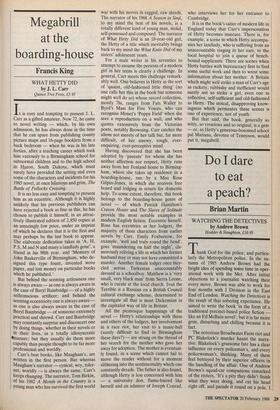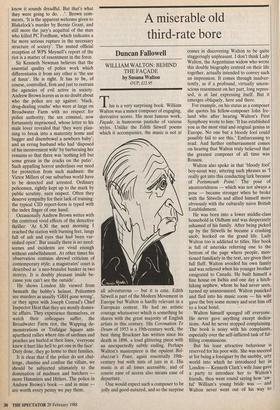Do I dare to eat a peach?
Brian Martin
WATCHING THE DETECTIVES by Andrew Brown
Hodder & Stoughton, £10.95
Thank God for the police, and particu- larly the Metropolitan police. In the au- tumn of 1985 Andrew Brown had the bright idea of spending some time in oper- ational work with the Met. After initial objections to a journalist watching their every move, Brown was able to work for four months with J Division in the East End of London. Watching the Detectives is the result of that sobering experience. He aimed to write the book 'in the form of a traditional precinct-based police fiction like an Ed McBain novel'; but it is far more grim, disturbing and chilling because it is fact.
The notorious Broadwater Farm riot and PC Blakelock's murder haunt the narra- tive. Blakelock's gruesome fate has a clear influence on every policeman's, and every policewoman's, thinking. Many of them feel betrayed by their superior officers in the handling of the affair. One of Andrew Brown's squad-car companions remarked of the rioters, 'It's a pity they didn't finish what they were doing, and cut his head right off, and parade it round on a pole. I know it sounds dreadful. But that's what they were going to do. . .'. Brown com- ments, 'It is the apparent welcome given to Blakelock's murder by Bernie Grant, and still more the jury's acquittal of the man who killed PC Fordham, which indicates a far more serious rupture in the necessary structure of society'. The muted official reception of WPS Meynell's report of the riot is a matter of resentment in the force.
Sir Kenneth Newman believes that the essential quality of police work which differentiates it from any other is 'the use of force'. He is right. It has to be, of course, controlled, firm and just to restrain the agencies of evil active in society. Andrew Brown leaves us in no doubt about who the police are up against: 'black, drug-dealing youths' who were at large on Broadwater Farm with no respect for police authority; the sex criminal, now fortunately imprisoned, whose letter to his male lover revealed that 'they were plan- ning to break into a maternity home and bugger and disembowel a newborn baby'; and an erring husband who had 'disposed of his inconvenient wife' by barbecuing her remains so that there was 'nothing left but some grease in the cracks on the patio'. Such appalling horror underlines our need for protection from such madmen: the Victor Millers of our suburban world have to be detected and arrested. Ordinary policemen, rightly kept up to the mark by public scrutiny, earn respect. Often they deserve sympathy for their lack of training: the typical CID report-form is typed with the index finger of one hand.
Occasionally Andrew Brown writes with the contrived vivid effects of the detective thriller: 'At 6.30 the next morning I reached the station with burning feet, lungs full of ash and eyes that had been var- nished open'. But usually there is no need: scenes and incidents are vivid enough without embellishment. At other times his observation contains shrewd criticism of contemporary style: a magistrates' court is described as 'a neo-brutalist bunker in two storeys. It is doubly pleasant inside be- cause you can't see the outside'.
He shows London life viewed from beneath the bobby's helmet. Policemen see murders as usually 'GBH gone wrong', or they agree with Joseph Conrad's Chief Inspector Heat that they are mostly domes- tic affairs. They experience themselves, or watch their colleagues suffer, the Broadwater Farm riot, the Wapping de- monstrations or Trafalgar Square anti- apartheid rallies where tins of sardines and peaches are hurled at their lines, 'everyone knew it hurt like hell to get one in the face'. Duty done, they go home to their families.
It is clear that if the police do not chal- lenge, chastise and confine the villain, we should be subjected ultimately to the domination of madmen and butchers more Himmlers and Hitlers. The police in Andrew Brown's book — and in mine are worth every penny we pay them.



















































 Previous page
Previous page